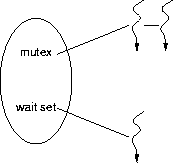- Like the lock, the wait set is per instance.
- Wait-set waiters are separate from the mutex waiters.

- This will cause some pain.
synchronized indicates a synchronized method.
class counter {
private int count = 0;
public synchronized void increase() { count++; }
public int value() { return count; }
}
synchronized (class-instance) { code-block }
method void f() {
synchronized (this) {
// f's body
}
}
class counter
private int counter = 0
public synchronized int
increase()
System.out.println("counter = " + value() + ".")
count++
public synchronized void
value()
return count
increase() still holds the lock after the value() call.
synchronized(obj) {
// access obj's fields
}
synchronized.
public synchronized void
change_name(String new_name) {
// whatever
}
public synchronized void
down() {
// wait until count is positive.
count--;
}
while (count < 1) { }?

wait(), notify(), and notifyAll()
provide conditional synchronization.
public void wait() blocks the calling thread in the wait set
wait() throws Interrupted Exceptions.
public void notify() unblocks a thread, if any, in the wait set.
public void notifyAll() unblocks all threads in the wait set.
notify() unblocks an arbitrary thread in the wait set.
notifyAll() threads is high.
notify() may unblock the wrong thread; tends to deadlock.
notifyAll() is more important than it should be.
if (!buffer_full) wait();
while (!buffer_full) wait();
buffer_full true.
class buffer
private boolean buffer_full = false
private Object buffer
public synchronized void
put(Object o)
while (buffer_full) wait()
buffer = 0
buffer_full = true
notify()
public synchronized Object
get()
while (!buffer_full) wait()
Object o = buffer
buffer_full = false
notify()
return o
synchronized code.
wait(), notify(), and notifyAll() provide conditional
synchronization.
This page last modified on 17 July 2002.